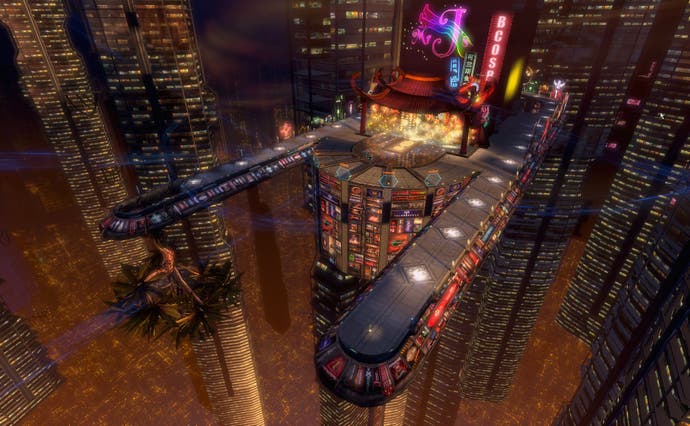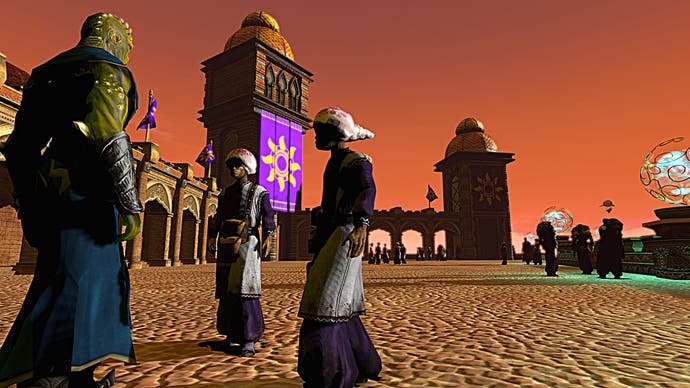Otherland
The virtual world about virtual worlds.
Lambda Mall will be the social centrepiece of Otherland, and provide its most scattershot, lightweight and casual gaming. Real U doesn't want the fractured nature of the setting to lead to a fractured game - the largely co-operative massively multiplayer gameplay will be the same across most of its realities - but in Lambda Mall, it is indulging itself in an orgy of minigames. Bars and shops with names like Alien Sex Friend host simple games with online leaderboards - we're shown a rhythm-action dance game in a miniature club where every avatar is shrunk to two inches tall. Real U promises 50 or 60 of these for the finished game.
These social areas also act as a stealth lobby system, where "hosts" will cross-reference players' data, and suggest quests in Otherland's multiple realities to them. Most quests will be set by NPCs, and have risks associated with failure - a reluctance on the NPC's part to offer it again, for example. But there will be player-generated quests too, which you'll be able to charge an in-game fee for access to, in a sort of lottery system.
Moving on to the game's many worlds - by way of "surfing", alarmingly literally, through a twisting network of data-splines and flight tubes - things become somewhat more structured. Real U is determined to introduce some of the production values and storytelling techniques of offline games to the MMO, whilst also avoiding a literal journey through the tale of the books, instead making every player like one of the books' minor characters - or, as Williams puts it, "building story into the experience at a cellular level".
There will be a loose structure that opens the worlds to you in some kind of sequence, but progress in one won't necessarily imply progress in the others, and the intention is to allow players some freedom over which virtual worlds they choose to inhabit. Unlike the static nature of most MMOs, these worlds will change over time and according to your actions, progressing through "phases" that are punctuated by dramatic events, illustrated in two and a half hours of cut-scenes.

These phases will work similarly to the use of instancing for storytelling in Lord of the Rings Online, or the progressive world-states used for the Death Knight starting area in next World of Warcraft expansion Wrath of the Lich King. It will be possible to "time travel" forwards through these, but not backwards - so you can bring a lower-level player up to meet you, but you can't go back to disturb the status quo for them.
Real U is only showing one world off at the moment. Mars - or rather, some Otherland characters' fictional, virtual interpretation of the red planet - is an ornate steampunk-cum-sci-fi world with Asian and North African overtones. There's a huge tower containing a labyrinthine Bazaar marketplace, sky-barges sailing around, beautiful aliens reclining in otherworldly gazebos.
It's alluring enough, but we're hoping - and to be fair, expecting - that the full range of worlds in Otherland will provide much more striking stylistic variations from the MMO norm. Some of the teasing hints we get include Egyptian mythology, contemporary settings, cartoons and a "wind tunnel" world, and it's noted that, these being virtual spaces, physics can vary hugely from one world to the next. That's not all - each world's rules are entirely defined by its owner, so in some, combat may not be possible at all. There will also be another space, outside of the worlds, where there will be a reason for player-versus-player conflict - but Real U refuses to be drawn on the details.

It's when you try and nail the developers down on the specifics of the game's design and mechanics - combat, crafting, questing, anything - that things get confusing and frustratingly vague. This is mostly because they're anxious to protect their ideas at this very early stage, but also because those ideas are so strange, so abstract.
Everything in Otherland is made of code, and your understanding of code and ability to manipulate it - the power of the link between you and the net, your "telemorphic capacity" - is what dictates your character's advancement, and acts as its health. It replenishes over time, but consistent damage reduces the total you can have, and at zero your own code degrades so much that you experience virtual death - lose your appearance, in other words.


